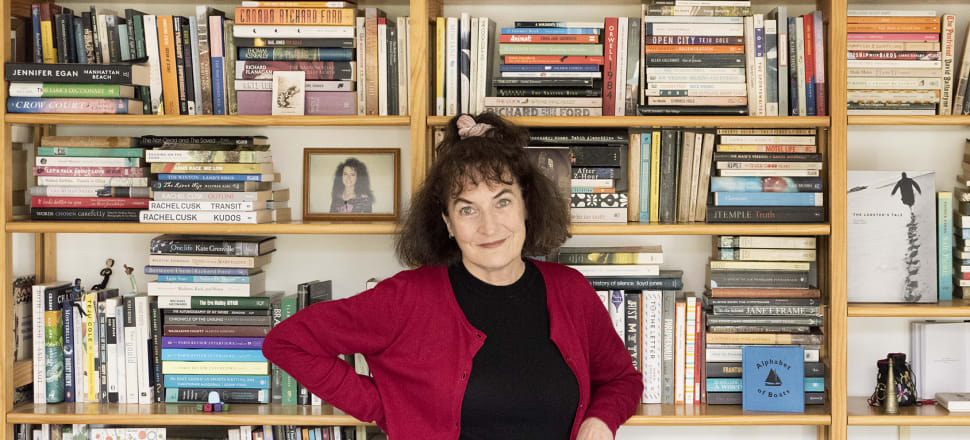
Backlash to De Goldi RNZ interview
Leading children's authors have reacted with shock and dismay at an interview given by author Kate De Goldi and School Journal editor Susan Paris on Radio New Zealand.
De Goldi and Paris are the co-editors of Annual 3, a spectacular large-format miscellany aimed at 9-13 year olds, or middle-grade readers. They appeared on the Nine to Noon show last week to hype the book. Host Kathryn Ryan was rather more interested and really quite insistent in asking about an apparent "reading crisis" among New Zealand children. One of the faults, she declared, was a lack of variety in books for 9-13 year-olds. She described it as a "dearth". Her conviction was that most were either farty mindless fun or – Ryan was especially upset by this – about New Zealand birdlife, which is apparently very boring. "What are you seeing in New Zealand produced-content," she asked, "that worries you?" To which De Goldi and Paris said yeah they were quite worried about the narrow options of farty mindless fun or boring books about New Zealand birdlife.
De Goldi: "Things do slide off into formula more than one would like." But fortunately, they chorused, Annual 3 – and the School Journal, which Paris has edited for the past 17 years – were focused on fresh, lively different forms of storytelling, such as comics and satire. Ye olde novels and non-fiction are not enough, the Annual's editors sang. Ryan said of her guests: "They want to raise the bar for what is on offer for young readers."
It's true that the Annual is a thing of wonder, a publishing event; some of the best writers and illustrators in New Zealand combine to dazzling effect. But authors of middle-grade books spoken to for this story felt there was a kind of arrogance in the RNZ interview - the Annual, a panacea to falling literacy; the Annual, above the bar - and took the inference that their own work falls under the bar.
I spoke with Tania Roxborogh, who won the 2021 Esther Glen Award for Junior Fiction and the Margaret Mahy Award at the New Zealand Book Awards for Children and Young Adults for her book Charlie Tangaroa and the Creature from the Sea. She said of the RNZ interview, "It's a shit take." I emailed Fifi Colston, author of one of the year's best junior fiction books, Masher. She felt that the interview was basically saying, "'You are all rubbish formulaic writers and we know better’. This has ruffled quite a few feathers in the kids lit community, people are pretty hurt by the assertion…. We can promote our own books without casting shade over others."
The interview provoked immediate heat on the Twitter machine. Auckland writer Paula Green: "Feeling so sick today and also sad that not just local children's authors but every NZ child who loves reading and reads widely is blindsided by the interview. I feel like crying but have to pick myself up & stick to my guns as an unofficial ambassador for our writers & children." Wellington publisher Fergus Barrowman: "I have zero tolerance for the notion that there aren’t good books. If kids of this age aren’t developing or maintaining a habit of reading, there are other reasons."
The Twitter response was led by author Rachael King, who tweeted that she had listened to the interview twice, and was baffled by it: "I think it does the great books out there (and their writers) a bit of a disservice. I'm sure there is a good point in there somewhere, but it was really vague and wishy washy and a bit... negative?"
I approached King for comment. She stepped back, a little. She emailed, "To be clear it wasn’t the authors I was taking issue with, but the interview, and more specifically, RNZ’s attempt to hang a perfectly good chat about a wonderful new book off an ‘issue’.
"I realised, when I went back and listened to the interview again" – a third time! – "that I had listened to the whole thing through the filter of RNZ’s framing of it online: 'Do young readers deserve better quality books?' I totally get what they are saying about children needing a wide variety of types of readings and I absolutely agree with them that in mainstream bookshops New Zealand books and other good novels (of which there are many! And which are available in good bookshops and in libraries!) are getting squeezed out by imported series, and I also agree with them that once kids are attuned to that sort of easy, formulaic reading that it’s probably harder to transition to more complex stuff.
"But what I heard in the interview" – which she had listened to three times! – "is that good quality, challenging fiction is not available, which is the point I take issue with. "
Tania Roxborogh, too, had listened to the interview three times (!). She said, "My problem with the interview – and this isn't the first time this information has come out, this 'dearth' of literature for middle-grade – is the messaging. I disagree that there is not enough amazing and eclectic reading material for kids because there is. The problem is that – and I really don't want to get into a slanging match with Kate and Susan, because what they're producing is amazing – but the fact that so many New Zealand children's authors have been hurt over the years by this message.
"What they're trying to say is tone deaf and they're getting it wrong. It's bullshit. It’s a shit take. There is no lack of variety. There's bilingual, there's non-fiction, there's stuff rooted in te ao Māori, there's fantasy stuff – there's heaps of stuff. Heaps. Yes, in bookstores we got tired of seeing imported stuff crowding out the local stuff. But to say there's lack of variety, nup. I don’t agree with that.
"The message was basically, saying, 'All you New Zealand authors, you are not doing it well enough but we are with this book [Annual 3.]' You can go on the radio and promote your book. And that’s great. But you don’t use your time and platform to put down other people who are making their living from writing for children."
On Twitter, Paula Green had rattled off the names of 15 authors of a variety of middle-grade books as reproof to the RNZ claims. Inevitably her rollcall featured the great veteran of middle-grade and junior fiction, David Hill, 80 this year. I asked the top old codger for comment.
Amazingly, he hadn't listened to the interview even once. Hill said, "I haven’t heard about the furore. Remote Taranaki, you know. But I certainly wouldn’t say there was a dearth of middle-range books. Kate herself writes splendid examples of them. We’re currently having a real efflorescence of new writers in the genre / band, with people such as Emily Joe, Sonya Wilson, Lauren Keenan, Cristina Sanders. (Yes, it would be good to see some male names there.) There’s also a terrific crop of writers and illustrators in te reo for this age group. Leonie Agnew continues to win awards in that level. Brian Falkner and Des Hunt the same. Even someone from New Plymouth called D*v*d H*ll has a new book coming out soonish."
I asked Tania Roxborogh who instantly came to her mind as authors of good middle-grade fiction. She speaks very fast and rattled off nine names in approximately 15 seconds: " Des Hunt. Brian Falkner. Leonie Agnew. Steph Matuku. Fifi's [Colston] latest book Masher – God I love that. Rachael King. Melinda Szymanik's short stories, which my Year 9 kids love [she teaches at high school]. Oh and Donovan Bixley! And of course the pony series by Stacy."
She meant Stacy Gregg, who has written at least one best-selling middle-grade novel every year since 2006. I approached Gregg for comment on the Nine to Noon interview. She said, "I’ve heard this argument before from Kate [De Goldi] and I have to say I am not entirely sure why she thinks middle-grade particularly is in the doldrums. Honestly, I have never seen such diversity and strength in the category as there is right now."
Most of the authors who I contacted said they felt the interview itself was slanted. RNZ's online story, too, was provocative. It read, "Do our middle readers deserve better quality books? Kate De Goldi and Susan Paris believe so. The pair say while there has been a big focus on picture books and young adult fiction, New Zealand's middle readers - children aged 9 to 11 - are being under-served."
So maybe RNZ had taken a skewed and slightly tabloidese approach – the headline to this story is far worse - but you can only shoot the messenger for so long. It's what De Goldi and Paris said that matters. When I asked Tania Roxborogh if she was angry with the interview, she said, "Not angry. Frustrated. Frustrated, that Kathryn [Ryan] had an agenda and was pushing a particular narrative from Susan and Kate, and I got a sense they felt put on the spot, but, but they still said those things.
"They could have said, 'We're not saying other writers are bad. We're just saying we want to enhance the mix' or whatever. But they didn’t say that."
*
New Zealand writing is shy and wary of robust argument. Reviews are often mild-mannered. (I recently commissioned a review of a large volume. In one of our email exchanges, the reviewer mentioned in passing that it was "a long-winded, turgid tome". Please write that in your review, I asked, without success.) New Zealand children's writing is even more of a brittle ecosystem. It's rare that any dissenting opinion is heard about anything; it's not where you would ever expect a feud or a stoush or a good old brouhaha. For the De Goldi-Paris interview to cause such an immediate reaction on social media was a sign that this time things were different, that this time things had gone too far.
Comments by Fifi Colston (who tweeted in passing that the controversial RNZ interview was a case of De Goldi and Paris pushing a particular barrow "not for the first time") and Tania Roxborogh ("This isn't the first time this information has come out") suggested that De Goldi and Paris had form, so to speak. I asked Colston what she meant by her remark.
She replied, "The line that comes out every time, starting at the 2017 Writers Festival is, ‘Fiction in Crisis. The Annual: A response to the dearth of quality fiction for 8-12 year olds.’ That’s a sweeping statement isn’t it? Pissed a lot of people off at the time but being kids authors we are often too polite to say it out loud."
Tania Roxborogh had also heard it before and did not wish to hear to hear it again. "I think it's time for Kate and Susan to retire that narrative."
It was time to hear more from De Goldi and Paris. They did not choose to retire their narrative. I emailed De Goldi and asked her to respond to social media criticisms of her RNZ interview. She emailed back a joint statement with Paris.
It read, "We all share a concern about the declining rates of literacy and reading in young people; Annual 3 (and its predecessors) represents a contribution to a problem that requires a multiplicity of approaches, including the work of writers from across the children’s writing community.
"But we weren’t on radio as ambassadors for the totality of local children’s literature, or to name check recent books that have caught our attention, or to denigrate the work of others. We were promoting Annual 3 and did our best to bring the conversation back to this singular publication…
"We’re not responsible for the way in which RNZ chose to promote the interview on its website. 'Raise the bar of what's on offer' and 'Do readers deserve better quality books?' are not our words." Quite right: they were Kathryn Ryan's words. But then their statement – sorry about this awful term – doubled down, which is to say it continued to present a challenge to the traditional model of New Zealand children's publishing.
"Our premise," they wrote, somehow or other together, "is that there's a lack of variety when it comes to local publishing, and we stand by this. There is little beyond fiction and classic nonfiction. We have talked consistently for many years about our interest in a diversity of forms, an approach that defines the Annual and is our point of difference.
"Kathryn Ryan asked what muscle needs to be exercised when kids read, and how they can experience a breadth of work in their reading. We answered with what else kids could be reading (satire, flash non-fiction, art commentary, poetry, visual storytelling, comics, board games) not who. She asked what was worrying us and again we spoke to the need for variety and experimentation with form. This is where the dearth lies.
"And yes, series chapter books by international authors often do crowd out all the rest when it comes to middle readers, including the work of New Zealand fiction writers for young readers. Check out the shelf space dedicated to the series imports. The Annuals are an attempt to counter these books and draw attention to what our writers and artists can do when they have new ways of reaching a young audience."
Hurrah, truly, for the Annual. The latest iteration is awesome. (Annual 1 was published in 2016, Annual 2 in 2017). But the impression its editors make on behalf of their "singular publication" is that the Annual, so creatively, so outstandingly, is pretty much the only inventive or appealing thing on offer for 9-13 year-olds wanting "a diversity of forms". The Annual experiments; The Annual has breadth. Everyone else, inferred De Goldi in her joint statement with Susan Paris, is kind of sad and trad and failing ("There is little beyond fiction and classic nonfiction").
Fifi Colston emailed, "As a contributor to the first Annual, I know what a great publication it is and how much care is taken with it. There is always room for diverse reading material for all our readers and this series is fun, no doubt about it.
"But (and here it comes) in essence this was a 19-minute promotion for a new book in the guise of ‘Saving Children’s Literature’.
"I would argue that it’s not the fault of books that are on offer. Aotearoa authors and publishers offer a huge variety of excellent reading material and farting books would be less than 2% of the material (and mostly on offer in picture books for younger readers). But do we authors get much of a look in when The Project will happily interview a slightly bored David Walliams live from the UK?"
Someone had finally uttered the dread name of Walliams. As the author of a countless series of bestsellers (Mr Stink, Gangsta Granny, etc etc), he has perfected the formula of farty mindless fun for young readers. But as a teacher, Roxborogh rejected the notion that Walliams' books were the only thing that kids liked. She pointed to packed sessions of children's books at the Auckland Writers Festival and the popular Storylines school tours as evidence that Kiwi kids are avid readers.
Rachael King, too, has witnessed huge enthusiasm for reading: "I recently hosted the schools day at WORD Christchurch and it provoked huge excitement with kids, and they lined up afterwards to buy books and get autographs. I think New Zealand children’s books are in pretty good health right now, with more and more diversity (including Annual) and when we can get New Zealand writers in front of children it is transformative for them.
"But outside of school events, how can we get kids and their parents to read more New Zealand books? I can’t help think about when WORD has hosted writers like Andy Griffiths, David Walliams and Jeff Kinney and more than 1000 tickets have flown out the door in a matter of days. But free festival events with local authors largely go ignored, apart from by a small handful of hardcore bookish families.
"How can we compete with the huge international marketing machines and elevate New Zealand writers in the eyes of children and their parents? That, for me, is the challenge."
The following range of very good middle-range books by New Zealand writers are available in bookstores nationwide.
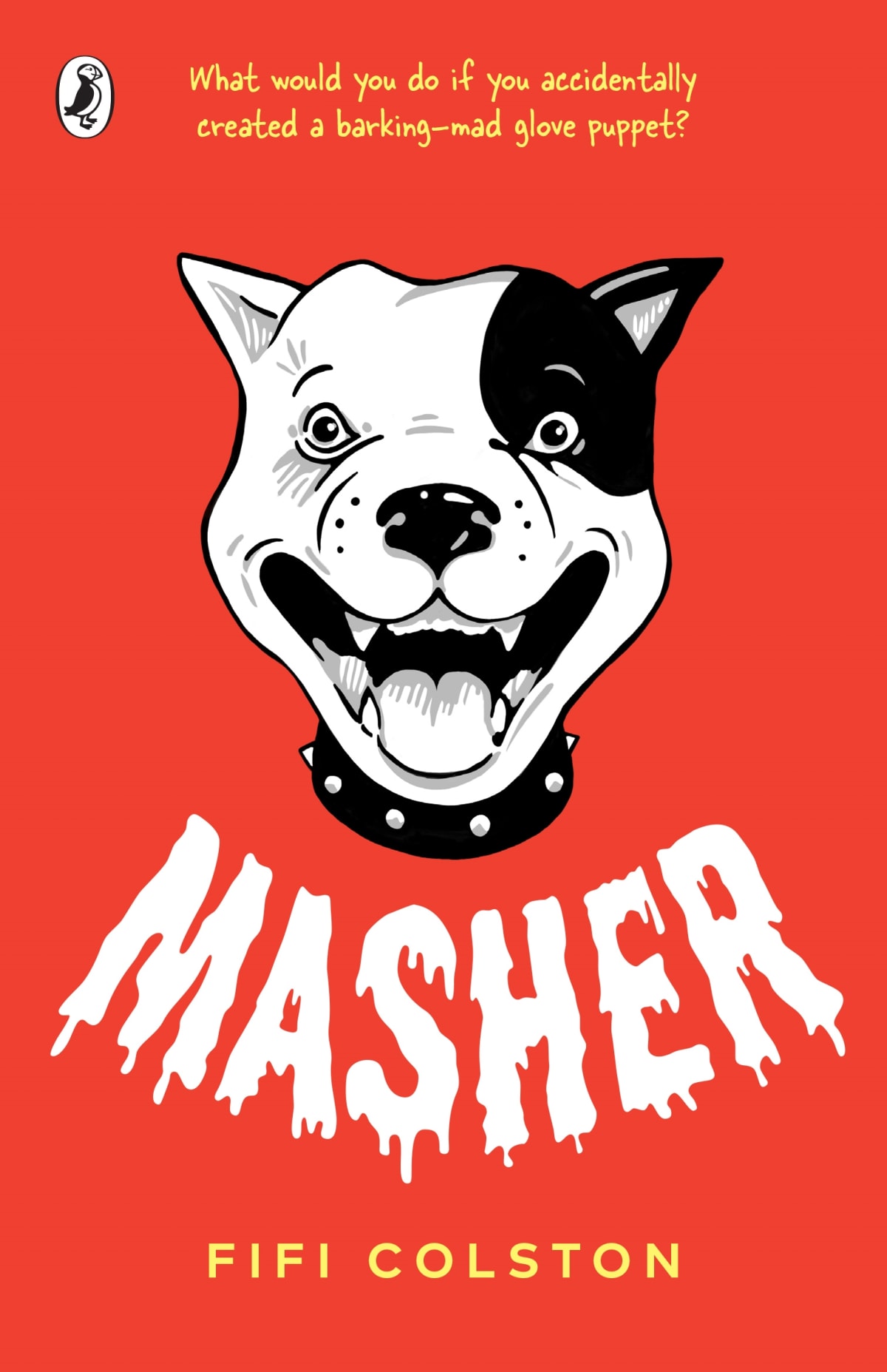
Masher by Fifi Colston (Puffin, $18.99): The adventures of 12-year-old Freddie Foxworthy and the ashes from his neighbour’s deceased bull terrier
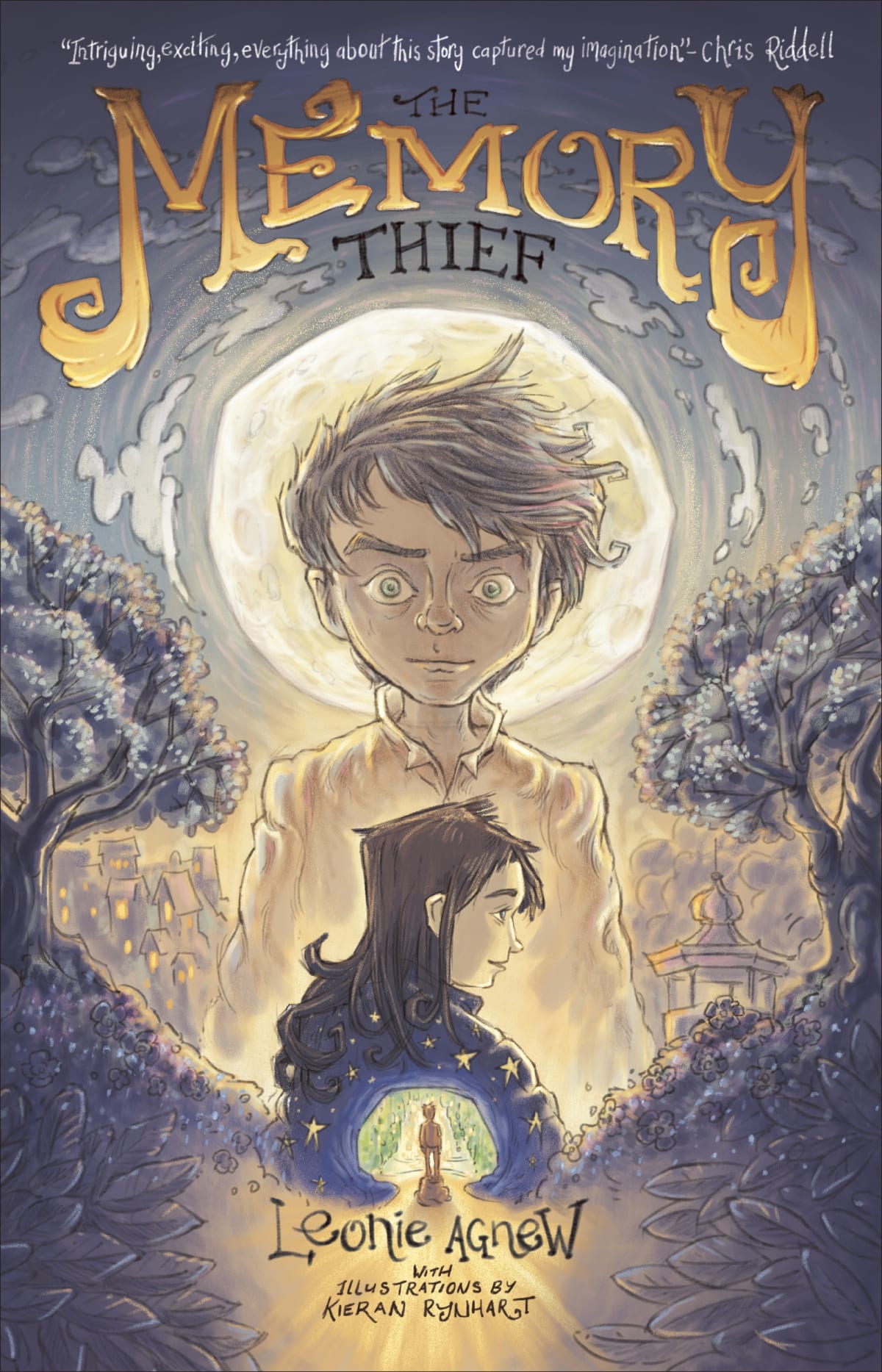
The Memory Thief by Leonie Agnew (Puffin, $19.99): About a lonely troll and fierce, spiky Stella.
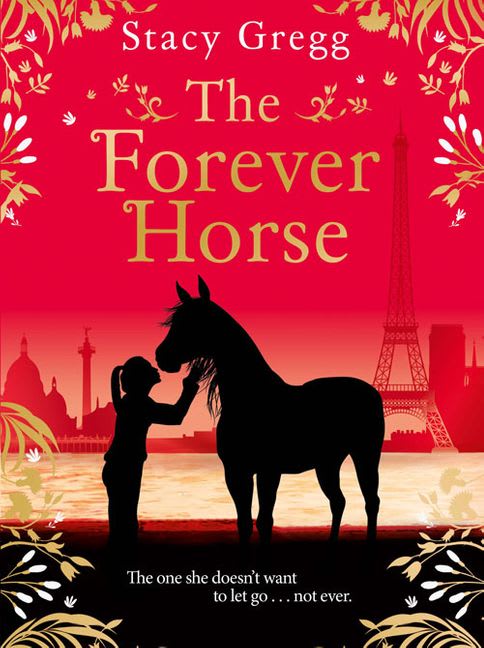
The Forever Horse by Stacy Gregg (Harper Collins, $19.99): Maisie and the black stallion Claude, in Paris.
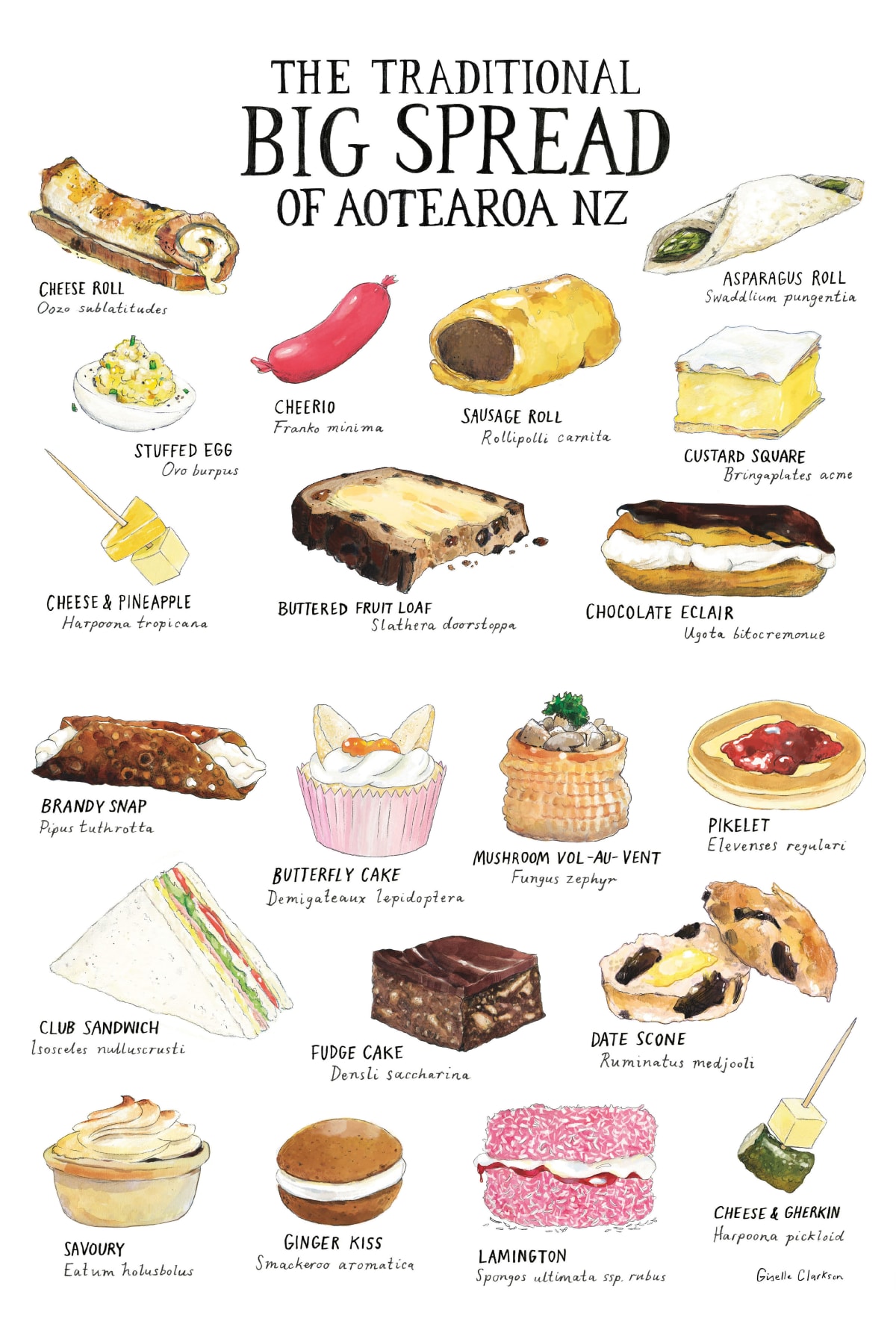
Utterly brilliant display of the New Zealand sweet treat, by Giselle Clarkson, one of many attractions in the newly published Annual 3 co-edited by Susan Paris and Kate De Goldi (Annual Ink, $40).







